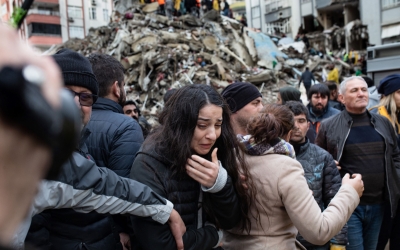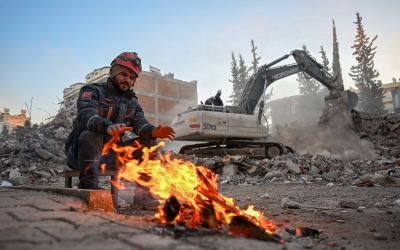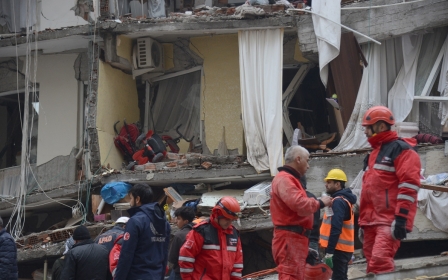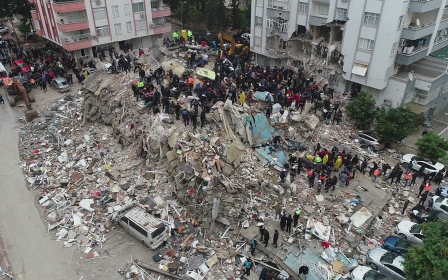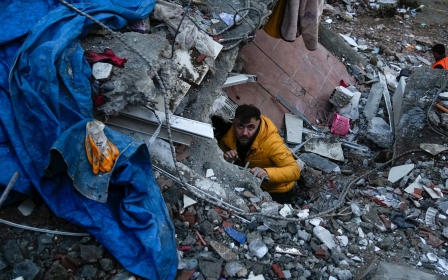Turkey earthquake: Erdogan declares ten cities 'disaster zones'
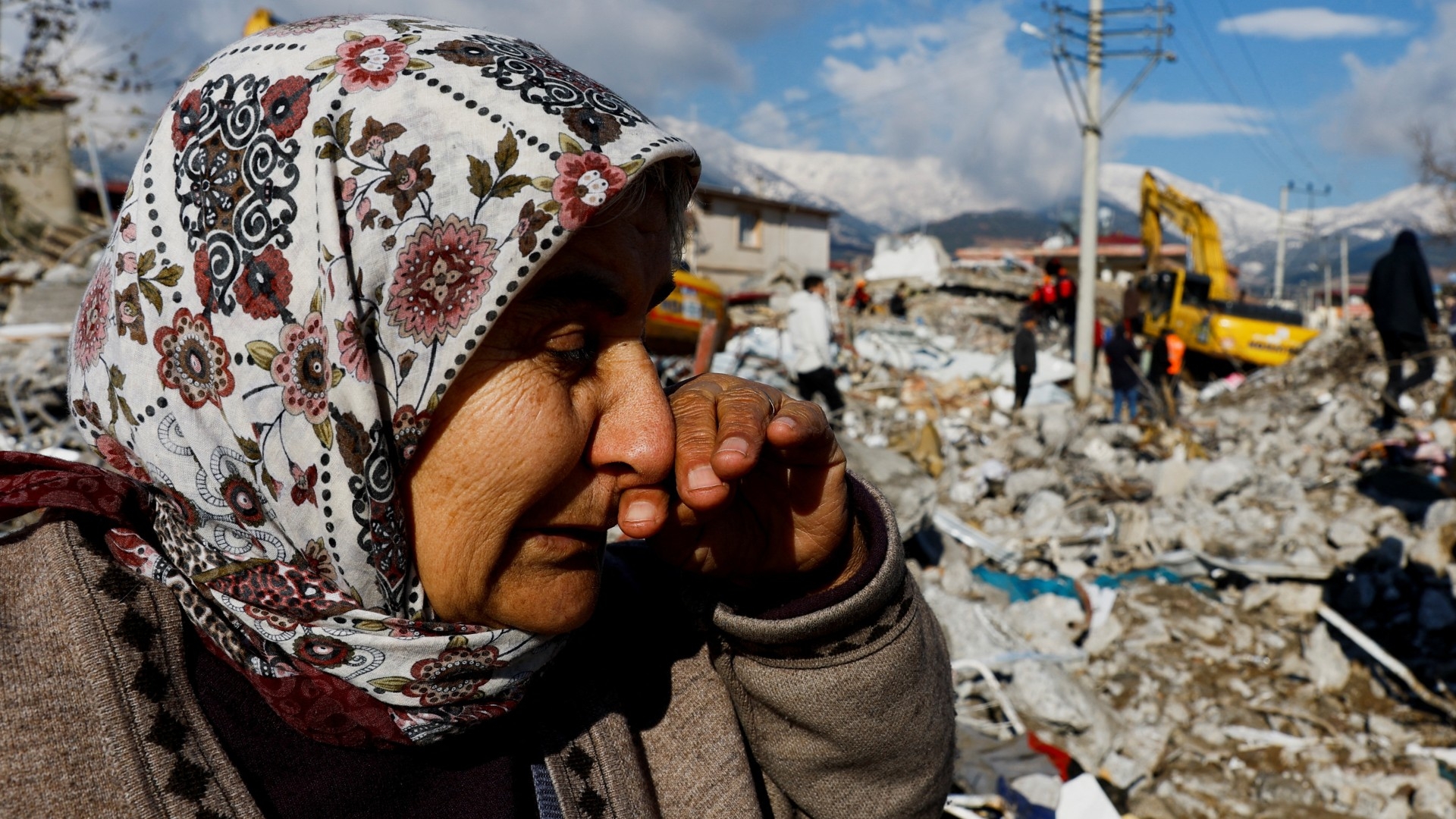
Turkish President Recep Tayyip Erdogan on Tuesday declared a state of emergency in 10 provinces impacted by the earthquake for three months, as Turkey and Syria are beginning to grapple with the sheer scale of damage caused by two consecutive earthquakes that have so far left at least 5,000 people dead, thousands injured and countless others homeless.
The 10 provinces have been designated as disaster zones, he said.
“We are facing one of the biggest disasters not only in the history of our republic, but also in our geography and the world,” he said in his first appearance on Turkish TV, from the disaster coordination centre in Ankara.
Rescuers in Turkey and war-torn Syria worked overnight through freezing temperatures in search of survivors.
Rain and snow have slowed rescue operations but specialised teams from Turkey’s disaster emergency agency AFAD and many other nations including Italy, the US, Germany and China are on their way to provide assistance.
New MEE newsletter: Jerusalem Dispatch
Sign up to get the latest insights and analysis on Israel-Palestine, alongside Turkey Unpacked and other MEE newsletters
The first 7.8 magnitude earthquake struck the Pazarcik district of Kahramanmaras Province on Monday morning at 4:17am local time.
Less than 12 hours later, a second 7.5 magnitude struck the same region.
Meanwhile, aftershocks continue to strike southern Turkey and northwest Syria.
Earthquakes of varying magnitudes between 4.1 and 5.5 hit the region on Tuesday, according to data from the US Geological Survey. That includes a 5.5 magnitude aftershock detected in the southern town of Golbasi.
Aftershocks are sudden, less violent movements of the earth's surface following a larger earthquake. Turkey is highly prone to quakes due to its location at the meeting point of three different tectonic plates of the Earth's core.
Erdogan announced that the death toll has jumped to 3,549, and more than 22,000 people have been wounded.
At least 8,000 people have been taken out of the rubble alive, he said.
"Our military forces are on duty in the disaster area with thousands of expert personnel, as well as 26 cargo planes, and our Coast Guard Command with its ships and boats," he added.
Meanwhile, Erdogan said that 70 countries have offered help with search and rescue operations, and that Qatar would send 10,000 container houses to Turkey.
He added that 53,317 search and rescue workers are deployed in the affected areas, with 54,000 tents, 102,000 beds and basic needs sent to the region so far.
The president said his government plans to open hotels in the touristic Antalya area to people impacted by the earthquakes.
As many as 20,000 feared dead
According to AFAD, more than 5,775 buildings have collapsed in the affected areas and a total of 285 aftershocks have been felt across the region.
In northern Syria, at least 1,559 people have been killed and more than 3,600 people have been injured.
The World Health Organization’s senior emergency officer for Europe, Catherine Smallwood, speaking to AFP, said that the final death toll could be as much as 20,000.
“There’s continued potential of further collapses to happen so we do often see in the order of eight-fold increases on the initial numbers,” she said, when the death toll stood at 2,600.
“We always see the same thing with earthquakes, unfortunately, which is that the initial reports of the numbers of people who have died or who have been injured will increase quite significantly in the week that follows,” Smallwood added.
Given the scale of the crisis, more than 40 countries have provided emergency aid and assistance to Turkey and Syria.
The WHO said that up to 23 million could be impacted by the fallout from the earthquake.
"Event overview maps show that potentially 23 million people are exposed, including around five million vulnerable populations," WHO senior emergency officer Adelheid Marschang told the UN health agency's executive committee.
International support
China announced that it would send emergency aid to Turkey initially amounting to $5.9m. In addition, China’s Red Cross will give emergency aid of $200,000 each to Turkey and Syria.
Australian Prime Minister Anthony Albanese said that his country would provide an initial $6.94m in aid to the affected countries.
In a similar move, New Zealand's Prime Minister Chris Hipkins, also announced $940,000 in aid to Turkey and Syria.
Sheikh Mohammed bin Rashid Al Maktoum, vice president and prime minister of the UAE, announced the dispatch of urgent humanitarian aid worth $13.6m to Syria.
Germany said it would provide Turkey with "all the help that we can mobilise," German Interior Minister Nancy Faeser said on Monday.
Germany’s Federal Agency for Technical Relief (THW) will increase its humanitarian assistance to northwest Syria by $1.1m.
The EU has also stepped in to help, with 27 rescue teams with over 1,150 personnel being sent to Turkey.
"So far, we've mobilised 27 search and rescue and medical teams from 19 European countries via the EU Civil Protection Mechanism to help Turkey after the earthquake," Janez Lenarcic, EU commissioner for crisis management, wrote on Twitter on Tuesday.
Middle East Eye delivers independent and unrivalled coverage and analysis of the Middle East, North Africa and beyond. To learn more about republishing this content and the associated fees, please fill out this form. More about MEE can be found here.


